I applied for an Apple Card. What they offered was a sexist insult
On November 7, tech entrepreneur and Ruby on Rails creator David Heinemeier Hansson shared a disturbing story on Twitter, alleging that the Apple Card was discriminating against his wife. Both he and his wife Jamie Heinemeier Hansson applied for the Apple Card, but he received a credit limit that was 20 times what she was given—even though the couple files joint tax returns and she has a higher credit score than he.
When the couple contacted Apple’s customer service, David reports that a representative blamed a black box algorithm for the discrepancy, then raised Jamie’s credit limit to match his without requesting more documentation. David’s Twitter thread went viral, and many others—including Apple cofounder Steve Wozniak—shared that they’d had similar experiences with the Apple Card. Wozniak said in a tweet that his credit limit on the Apple Card was 10 times that of his wife, even though they share all bank accounts and assets.
“Apple has handed the customer experience and their reputation as an inclusive organization over to a biased, sexist algorithm it does not understand, cannot reason with, and is unable to control,” David wrote.
Goldman Sachs, which launched the Apple Card in a joint venture with Apple in August 2019, shared a statement saying, “we have not and will not make decisions based on factors like gender.” When reached for comment, Apple declined to respond and instead directed Fast Company to Goldman Sachs.
Since the Heinemeier Hanssons shared their story, the New York Department of Financial Services has launched an investigation into the Apple Card, according to Bloomberg.
While David has publicly documented the couple’s travails with the Apple Card, Jamie recently published a blog post in response to the speculation about her. It is republished below, with permission.
My name is Jamie Heinemeier Hansson. Since my husband, David, tweeted about an unfortunate and ridiculous situation with Apple Card that involves me, I have been (or my credit-worthiness has been) the subject of lots of speculation. Unlike David, I am an extremely private person who does not post on social media. I am slightly mortified to have my name in the news. However, lest I be cast as a meek housewife who cannot speak for herself, I would like to make the following statement:
I care about digital privacy. It’s why I wanted an Apple Card in the first place.
I care about transparency and fairness. It’s why I was deeply annoyed to be told by Apple Card representatives, “It’s just the algorithm,” and “It’s just your credit score.” I have had credit in the U.S. far longer than David. I have never had a single late payment. I do not have any debts. David and I share all financial accounts, and my very good credit score is higher than David’s. I had a career and was successful prior to meeting David, and while I am now a mother of three children—a “homemaker” is what I am forced to call myself on tax returns—I am still a millionaire who contributes greatly to my household and pays off credit in full each month. But Apple Card representatives did not want to hear any of this. I was given no explanation. No way to make my case.
I care about equality. It’s why I told David he could tweet about this situation, even though the credit limit extended, or not extended, does not matter for my livelihood. It matters for the woman struggling to start a business in a world that still seems to think women can’t be as successful or creditworthy as men. It matters to the wife trying to get out of an abusive relationship. It matters to minorities harmed by institutional biases. It matters to so many. And so it matters to me.
I care about justice for all. It’s why, when the Apple Card manager told me she was aware of David’s tweets and that my credit limit would be raised to meet his, without any real explanation, I felt the weight and guilt of my ridiculous privilege. So many women (and men) have responded to David’s Twitter thread with their own stories of credit injustices. This is not merely a story about sexism and credit algorithm black boxes, but about how rich people nearly always get their way. Justice for another rich white woman is not justice at all.
I care about companies and people doing the right thing. We cannot bow down to the algorithms. We cannot keep sliding into a Black Mirror world. Apple can and should be better than this. We should all be better than this.
Finally, I hear the frustration of women and minorities who have already been beating this drum loudly and publicly for years without this level of attention. I didn’t wish to be the subject matter that sparked these fires, but I’m glad they’re blazing. I may be silent on social media, but I am not silent. The debates and conversations David and I have about the world, and my observations, are often the source of his tweets. We are raising three boys together, and you better believe they hear a mother who is just as opinionated and just as equal as their father. On this topic David and I are thoroughly united, and I’m glad his large platform and my Apple Card issue have sparked a national conversation around institutional biases, black box algorithms, and the broken system that is our credit industry. This is not a story about me. Brilliant women are all over social media, using their voices to strive for a better way forward. Listen to them.
(22)



